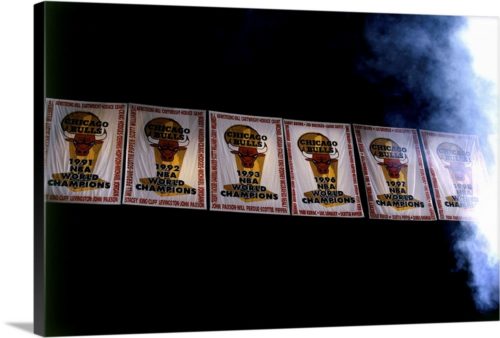Count me among the millions engrossed in “The Last Dance” for the past several weeks – the account of the ‘97-’98 Chicago Bulls championship run, with Michael Jordan as the central figure. Jordan’s on-court greatness has been visible to all for years. “The Last Dance” provides a new, interesting perspective to Jordan’s motivations and methods. It is easy to get swept up in Jordan’s greatness, but the story is bigger than Jordan. I have found broader lessons about realizing potential that apply to any person or organization, especially small businesses.
I have a special affinity for Jordan. We both left the University of North Carolina in 1984. I had a degree and he did not (at the time- completed later). And look at us now! In all seriousness, much of the footage brought back some great memories. Here are my four big takeaways.
Standards of Excellence Are Situational – Choose Yours
Potential is the gap between where you are today and where you are capable of being one day. Don’t talk about being great without being able to define it. Sports performance is easily defined. Everyone knows what the rules are. No matter where you are playing, there will only be one winner.
It is not so easy in business. Sure, businesses win awards in communities and industry associations. But do these awards really align to your intentions? Do you have enough information to show your team how your business compares to the industry in growth rates and profitability? Client engagement? So many opportunities to distinguish yourself, realizing potential that many team members may not understand on their own. It is your responsibility to define it for them.
Most importantly, does your definition of greatness motivate every person on your team? I have not met a person yet who does not, deep down, relish that moment when they knew they were the best at what mattered to them.
Recruitment – Mindsets and Talents
As great as Jordan was, he did not win championships right away. Team ownership made changes at every position during Jordan’s tenure, including head coach. It was not until Phil Jackson got Jordan to trust in teammates that the championships started rolling, but management had to field a team that Jordan could trust. They staffed on both mindsets and talents. Those without a burning desire to win did not stay long.
The Bulls also did a great job of recognizing talent over reputation. Some people get the hype, and others are simply great. Leaders are great at seeing what people are becoming and are committed to being the person that brings out the very best in all. The right environment enables talents to flourish into performance greatness. People still marvel that Jordan was not the top draft pick in 1984, and there is no better example of “talent over reputation” in this story than Scottie Pippen – from University of Central Arkansas to NBA champion, All Star, and double Hall-of-Famer. Who would have thought that?
For your business, whether W-2 employees or a suite of specialized independent contractors, how do you identify winning mindsets cut through reputation to talent and growth potential under your leadership?
Law of the Rubber Band
Realizing potential requires personal growth. One of my favorite principles in John Maxwell’s 15 Invaluable Laws of Growth is The Law of The Rubber Band, which states that growth stops when you lose the tension between where you are and where you could be. Low expectations do not help anyone grow, yet unreasonable expectations will make the band snap.
One of the nuances in this law is that you do not have to tell your people your wildest dreams all at once. They may not be able to handle it. Hold your own vision of excellence with the full knowledge that you can change what you communicate over time. Always push and stretch no matter how good or big you have gotten. You cannot see beyond your current horizon, but there is always something bigger out there. In this documentary, Jordan and the Bulls were hunting their second three-peat. The Celtics’ Bill Russell won 11 world championships in 13 years, battling the likes of Wilt Chamberlain. A whole other level.
Motivation is different for everyone
Motivation is simply a reason to act. I do not think sport will ever find a more determined warrior than Jordan. One columnist recently described his will to win as “pathological”. I do not know about that, but I do know that the extent to which Jordan internalized anger to motivate himself made me very uncomfortable, the way the slightest comment or gesture from an opponent would fuel him with anger and retribution. Sometimes he made them up!
That was Jordan’s system. He was surprised and often frustrated that it did not work that way for all his teammates.
One of the brilliant motivational lessons from the series was watching three different effective motivational styles at work – Jordan’s shaming and bullying, Jackson’s Zen-like knowledge of each player’s “inner space”, and Pippen’s devout friendship, grace, and encouragement. Most players suggested that it took all three styles to make the Bulls threepeat champions. An observation more than a judgment – wasn’t it interesting that the Pippen-less Bulls (recovering from surgery) played .500 ball, but the Jordan-less Bulls (baseball career) made it to the playoffs?
The key takeaway for me is that no matter how you do it, every person on the team needs a reason to act with urgency and intensity. There is simply no substitute for hard work – practice, games, on your own. The Bulls’ collective effort was so intense it made me tired from my couch! It is worth the time to understand what makes people “tick”.
It Is Worth It
Some people and organizations do not realize potential because they are afraid of their own greatness – feeling not worthy of it and reticent to pay the price to achieve it. With respect to potential, the cost of doing nothing is always greater than the cost of doing something. Get started on your greatness today.








